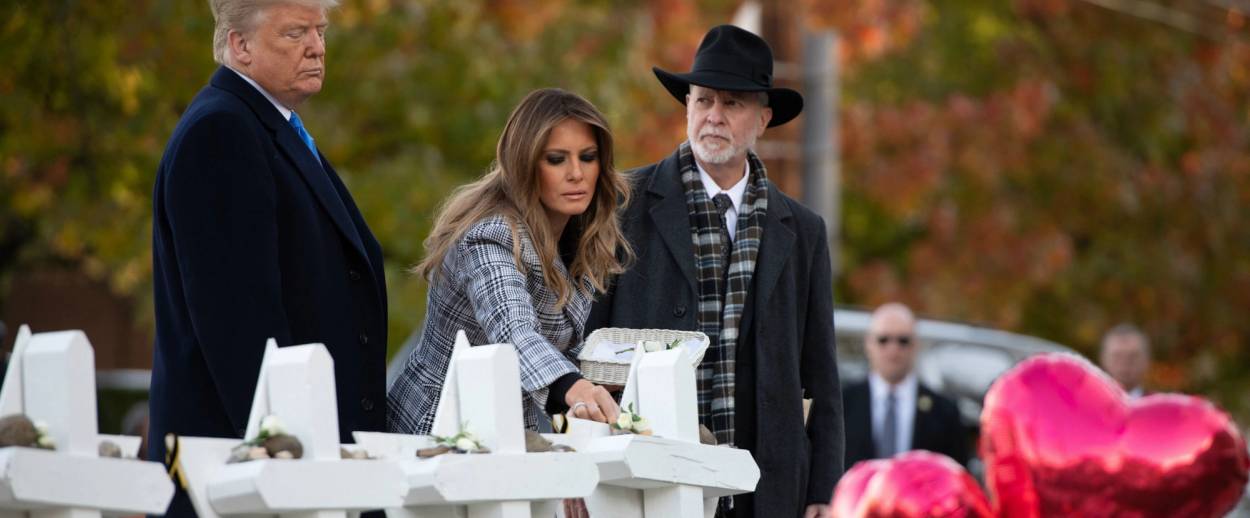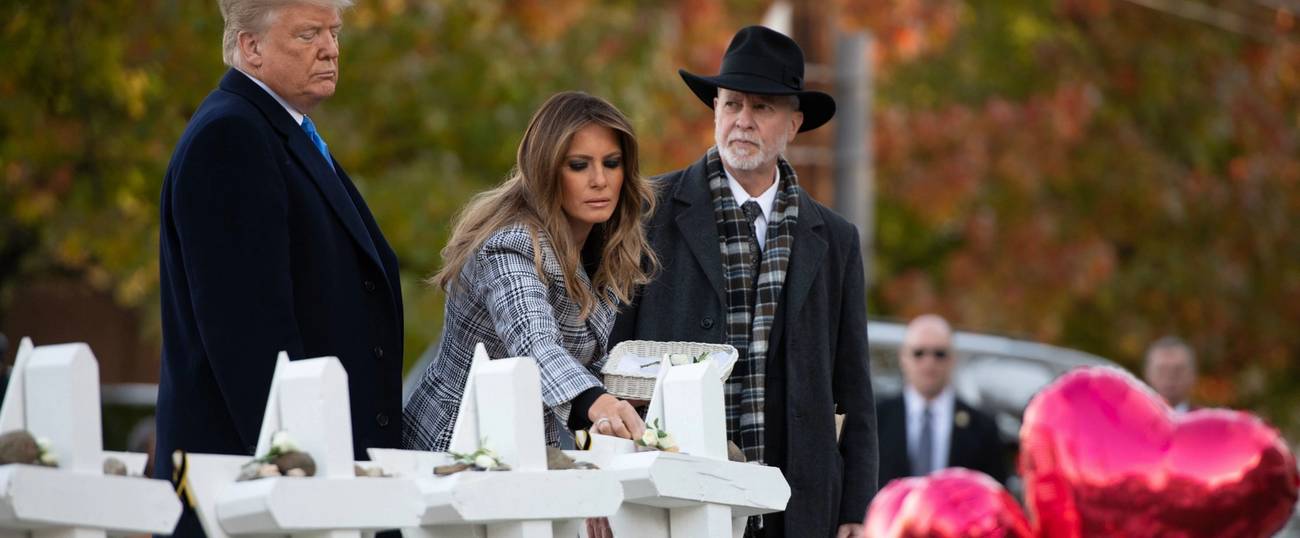America’s Yellow Star
When anti-Semitic tropes are used to score cheap political points, violence follows. It always has.




This time, it was different. The mass shooting at the Tree of Life synagogue in Pittsburgh stands as a direct assault on the lives and human dignity of everyday Americans because of who they are and what they believe. They were murdered for no other reason than the fact that they were Jewish. At a time of partisan hate-mongering and increasing political violence, the bloodshed shows that anti-Semitic rhetoric leads to anti-Semitic violence. If we don’t confront it head-on, it will lead to more in the future.
The shooting came after a week of attempted bombings of the homes and offices of American leaders and news organizations across the country, including philanthropist George Soros, who has become the target of countless conspiracy theories “dripping with the poison of anti-Semitism,” as his son, Alexander Soros, recently put it. Soros’ targeting and the synagogue shooting demonstrate that the architects of today’s rampant anti-Semitic rhetoric–regardless of how coded it is–have crossed a moral line, one which leaves the rest of America no longer able to pretend that this kind of incendiary rhetoric won’t lead to anti-Semitic violence. It just did.
Anti-Semitism today doesn’t always look or sound like it has in the past. It often doesn’t come with a yellow star, or even an explicitly anti-Semitic slur. Instead, leaders prey on people’s basest fears about the ‘other,’ referencing “globalists” or “global special interests” as those responsible for all our nation’s problems. Soros is a favorite among this crowd, cited as being the shadowy, nefarious force behind everything from the refugee crisis in Europe, to the opposition to Justice Brett Kavanaugh’s Supreme Court nomination, to the caravan of migrants currently headed to the U.S.-Mexico border.
The stereotype of the all-powerful Jew isn’t new. It is a well-worn anti-Semitic trope taken directly out of The Protocols of the Elders of Zion, the speeches of Father Charles Coughlin and the chants of white nationalists on the streets of Charlottesville, Virginia. Tragically, hateful rhetoric that seemed so marginal just over a year ago now appears relatively commonplace; where it once seemed to be confined to the fringes, it is now widespread and deadly.
It isn’t necessary to recount the instances where George Soros is vilified and demonized. Whether or not you agree with Soros politically, the vitriol aimed against him is representative of the broader trend of coded anti-Semitic rhetoric. When the president’s lawyer, Rudy Giuliani, calls Soros “the anti-Christ” and says that “he must be stopped,” we are no longer dealing in vague references, but actually trading in old school anti-Semitism. The shooting shows that the logical conclusion to this kind of anti-Semitic rhetoric is anti-Semitic violence.
By embracing this coded anti-Semitic rhetoric, President Trump and other Republicans have signaled to white nationalists and other far-right extremists that it is not only tolerated but politically advantageous to espouse the kind of vitriolic, bigoted rhetoric that leads to violence like the Pittsburgh shooting. Sadly, it has proven politically effective for some leaders to dog whistle anti-Semitic rhetoric in order to animate the forces of hate while maintaining a thin veneer of plausible deniability. Today, they name-drop Soros and the “globalists,” where past generations would’ve simply said Rothschild, Marx, or Dreyfus.
Tyrants and their henchmen don’t bring anti-Semitism to town; they organize the anti-Semitism that already exists there. The truth is, it’s not anti-Semites who put American democracy in jeopardy, but rather our willingness to politically tolerate their rhetoric that does. In recent years, anti-Semitism on the right has only grown and become more effectively weaponized, while the opposition remains flat-footed and incapable of offering a response. It’s time for this to change.
Anti-Semites have given us an opportunity to be the moral voice against intolerance, and patriotic, fair-minded Americans should unapologetically seize it. First, we respond ethically: We can’t let the Jewish community be isolated. Just as “Je suis Charlie” became the mantra in France after terrorists attacked the Charlie Hebdo magazine office, we must stand side by side with the Jewish people. I am George Soros. I am the Tree of Life synagogue.
When Trump campaign ads alleging corruption feature stars of David on them, we must call this out for what it is: anti-Semitism. Just over a week ago, President Trump stepped on his own initial call for unity following the bomb threats by railing against “globalists” and encouraging chants calling for George Soros to be locked up. What is clear is that when anti-Semitic tropes are used to score cheap political points, violence follows. It always has.
We must continue to hold our elected officials accountable, as we did through our vote this week. Any candidate’s notion of a path to victory that rests on white nationalist anti-Semitic hate couched in coded rhetoric must become a strategy they will come to long regret. It’s on us to ensure that it does.
The shooting in Pittsburgh wasn’t the beginning stage of anti-Semitic hate; it was its logical conclusion. Anti-Semitic rhetoric doesn’t exist in a vacuum. While it festers online and in political discourse, it takes form and manifests in people’s actions. Most recently, it motivated a man to gun down worshippers for no other reason than that they were Jews. We can’t bring them back, but we can unite against the anti-Semitic bigotry that led to their deaths. We must.
Eric Ward is the Executive Director of Western States Center, which challenges white nationalist movements while strengthening the organizing capacity of often-marginalized communities. Simon Greer is a longtime community organizer and social change leader. Today, he is the founder of Cambridge Heath Ventures, a strategic advisory firm.